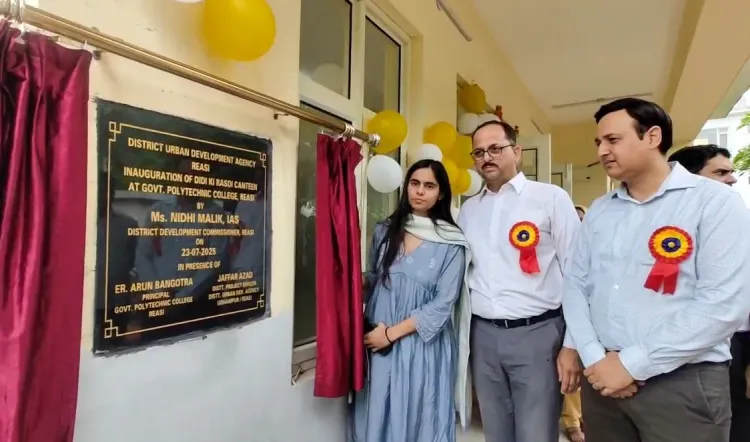How is J&K's ‘Didi Ki Rasoi’ Canteen Empowering Women?

Synopsis
Key Takeaways
- Women empowerment through job creation.
- Affordable, nutritious meals for the community.
- Support for Women Self-Help Groups.
- Encouragement of culinary skills and entrepreneurship.
- Commitment to inclusive development in J&K.
Reasi, July 24 (NationPress) In a significant step towards women's empowerment and community development, Deputy Commissioner Nidhi Malik officially opened the “Didi Ki Rasoi” canteen located at the Government Polytechnic College in Reasi, J&K on Thursday.
This initiative, run by Women Self-Help Groups (SHGs) under the Deendayal Antyodaya Yojana – National Urban Livelihoods Mission (DAY-NULM), aims to deliver affordable, hygienic, home-cooked meals while creating job opportunities for women.
The inauguration event was attended by Project Officer DUDA Udhampur-Reasi, Jaffar Azad, Principal of the Polytechnic College Arun Bangotra, and various other notable guests.
“Didi Ki Rasoi” fulfills a dual role: it empowers women by providing a sustainable income while also ensuring access to nutritious and reasonably priced food for the community. In addition to fostering economic uplift, it serves as a platform for SHG members to showcase their culinary skills and entrepreneurial abilities.
DC Nidhi Malik commended the initiative and recognized the contributions of the SHG members along with the supporting departments.
“This is merely the beginning. With this canteen, we are not only creating job opportunities but also building confidence and leadership among women,” she remarked.
She emphasized the administration's commitment to inclusive development, promising that more initiatives like this will emerge across Reasi.
Moreover, she mentioned that plantation drives are concurrently being carried out, underscoring the district’s commitment to holistic development.
“We are hopeful that these women will manage the canteen effectively and motivate others,” she added.
In line with the ethos of the DAY-NULM mission, “Didi Ki Rasoi” represents more than just a canteen; it is a movement towards financial independence, skill enhancement, and social transformation. The canteen provides wholesome meals such as rice, dal, sabzi, roti, and pickles for only Rs 30 per thali, focusing on hygiene, affordability, and flavor.
Having already impacted lives in states like Bihar and Uttar Pradesh, this model is now fostering change in J&K. Many women involved are entering the workforce for the first time, becoming earners and influential decision-makers in their families.









